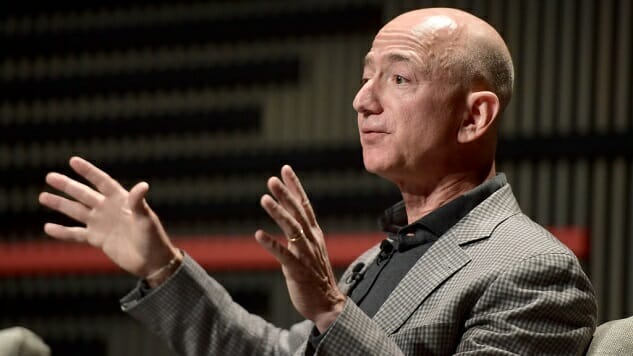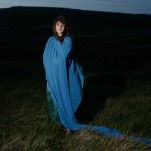AMI’s “Newsworthiness” Defense in Publishing the Bezos Pics Makes a Mockery of Journalism
Photo courtesy of Getty
There are many elements of the developing story about Jeff Bezos and his current archnemesis, America Media Inc., that feel like plot points for a hit Amazon Original Series: a scandalous affair, a billionaire, a notoriously tawdry tabloid, politicians, possible extortion, bad mustaches (hello, David Pecker), and yes, some nudes. Add to that the most recent report that it was Bezos’ mistress’ brother, Michael Sanchez, who leaked the texts to the National Enquirer in the first place, and you’ve got yourself a full-on family betrayal to round out the mix.
The only issue with the story as, well, a news story, is that even though its salacious details have made for great newsstand sales (the New York Post’s attention-grabbing headline Friday screamed “BEZOS EXPOSES PECKER” in a double entendre for the ages), it’s questionable whether the naughty pics really do deserve a spot in the news in the first place. At least, this is what Bezos is contending in his plight against AMI.
“My lawyers argued that AMI has no right to publish photos since any person holds the copyright to their own photos, and since the photos themselves don’t add anything newsworthy,” Bezos wrote in part for his now-viral Medium blog post. AMI’s argument is that publishing the private images are in fact “necessary to show Amazon shareholders that [Bezos’] business judgment is terrible,” and therefore should be permitted.
But is that really a worthwhile and/or logical way to think about what deserves page space? Would seeing a super-rich man’s “below the belt selfie” plastered across the front page (or perhaps laid out tastefully in the tabloid’s centerfold) mark the difference between an Amazon shareholder’s blind faith in the company and a nationwide decision to boycott the behemoth brand?
What Bezos and AMI’s epic Goliath vs. Goliath showdown seems to be doing above all else is exposing how slippery the concept of “newsworthiness” has become in today’s media landscape, where any and every development feels like it’s deserving of a post, a headline, or a heated discussion between talking heads. We’ve seen how instances of salacious gossip have actually sunk the publications that proliferated it, due in large part to the fact that there wasn’t anything actually newsworthy about the material that was published (See also: Hulk Hogan, sex tape, Gawker). We’ve also seen how the National Enquirer was rewarded with a Pulitzer Prize nomination for breaking the news of John Edwards’ affair with Rielle Hunter—and their subsequent love child—the takeaway here being that public figures’ personal lives are at-times newsworthy.
We’ve definitely seen how Trump’s every tweet, move, misstep, and sneeze was covered during the 2016 campaign season, headlines that oftentimes prioritized clicks and page views over any actual consideration of newsworthiness. (I know firsthand, having written countless posts and pieces about his foibles, meme-able moments, and nonsensical missives back in the day). This instinct to report on the latest, even if the latest amounts to little more than a new tweet, a reaction to, or an appearance (or, in the case of Bezos, a few racy pics), feels somehow unique to the digital landscape within which the news frolics these days. It’s an instinct that blurs the line between need to and want to, which is the very line of restraint that sets journalists apart from, say, that kid from your high school who shares every thought about every single thing that they see and experience on Facebook.
Which is what, ironically, makes AMI’s eagerness to release Bezos’ private photos, rather than the actual photos themselves, all the more newsworthy. Because outside of sensationalism, publishing photos that were privately sent between Bezos and his girlfriend, Lauren Sanchez, doesn’t really add much to an already cluttered media landscape. In fact, it feels like a manifestation of all the things that can, and have, gone wrong with journalism. This is the story behind the story, and it brings into question the relatively low bar that we’ve come to accept as the standard for newsworthiness in an age where shock and awe is too often mistaken for novelty, newness, or something worth reporting.
I wrote back in May 2017 that the sale of Us Weekly to AMI could dramatically change the news industry. At the time, it was a known fact that David J. Pecker was a good friend of Trump’s, but it was a fact that was often glossed over because Us Weekly was, after all, not a “hard news” outlet. But the ties between entertainment (“soft news”) and politics (“hard news”) are a lot clearer now, especially as the line between them grows ever-more blurred.
Pecker and AMI’s most recent attempt to throw a veritable red herring of dick picks into the already-complicated sea of political motivations is telling, because they assume (perhaps rightly so) that readers are so easily distracted that they’ll latch onto the images and forget about the actual secrets at stake: AMI’s. Just look at the pro-Saudi tabloid that AMI published last spring, ostensibly to curry favor with Crown Prince Mohammed Bin Salman. Or the two women that AMI admitted to paying off to help clear the path for Trump’s election back in 2016. To throw the term “newsworthiness” out as a cover for politically motivated activity is not only ethically corrupt, but also damaging to the actual institution of journalism itself.
Is it odd to feel sympathy for Bezos, a billionaire whose fortunes rest on the backs of underpaid workers? Or for a man whose extramarital affair and lack of prenup could actually impact his employees, shareholders, and investors’ livelihoods? Yes, absolutely. But in the interest of maintaining a baseline journalistic standard of decency (read: making sure that the news is still actually news), it’s necessary to call out the forces and the publications that are making a mockery of what journalism stands for in the first place—even if it means siding, temporarily, with one Goliath over the other. And, just as importantly, it’s a reminder to keep ourselves in check, so as not to get pulled under by the strong current of sensationalism that’s overtaken the industry.






































